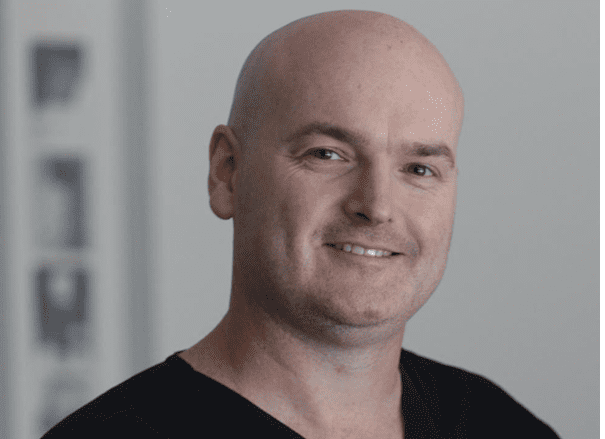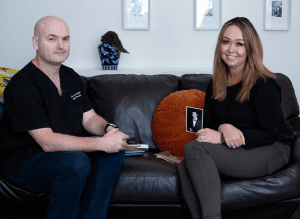As the UK grapples with the difficult issue of assisted dying, health correspondent Shaun Lintern speaks with a doctor giving his patients ultimate control over their lives

Dr Cameron McLaren has been present at the deaths of 43 of his patients
It has been two years since Cameron McLaren inserted a needle into the arm of Phil Ferrarotto. Minutes later the businessman was dead and Cameron faced his new reality as a doctor who had provided euthanasia to one of his own patients. In the time since, Dr McLaren, a 38-year-old medical oncologist, has given fatal doses of powerful drugs to 15 people and he’s been present at the deaths of 27 other patients who all took the drugs he had prescribed them.
He is one of 183 physicians in Victoria, southeast Australia, who are actively part of an assisted dying process for terminally ill patients.
It’s a process similar to what some campaigners and lawmakers would like to see adopted in the UK and a bill to legalise assisted dying recently passed its second reading in the House of Lords.
The father-of-two, from Melbourne, agreed to speak to The Independent about what it was like for him as a clinician trained to save lives, to be involved in ending so many.
But having now helped to end the lives of 16 of his own patients and witnessing the deaths of 43 in total, Cameron quickly reveals his deep grasp of the choices his patients face and why what he does is not wrong.
“What I do isn’t evil,” he tells me. “It is appreciated by the patients and their families more than anything I’ve ever done in medicine. And it’s the most gratifying work that I’ve certainly ever done, not only in terms of providing the service to the patients and their families, but also being able to share my experience and demystify some of the perspectives on assisted dying as well.”
I ask him if he thinks of himself as a killer and his response goes to the heart of why he and other doctors involved with assisted dying do what they do. It’s about patient choice.
“I’m not a killer. This isn’t killing. The cancer or underlying medical condition has already done that, it’s brought about the social death of the patient and the end of the quality of life that they deem minimum to want to continue. “They’re stuck in purgatory between living and dying and desperate for the end, and this is providing them with that. These people are choosing to make a decision and control how that happens, and I don’t agree with that being a wrong thing.”

For Phil Ferrarotto, death was a release after 18 years of fighting cancer that had invaded multiple organs and left him struggling to breathe and in near-constant pain. The pair bonded over what they were about to share and Ferrarotto kept his humour to the end; with trick or treaters visiting houses outside, he told Dr McLaren after they were done he should wheel him outside so they could “win best decoration”.
His appreciation for what Cameron did for him reached out from beyond the grave. After he was dead, his daughter Katie Harley took Cameron to another room and handed him a letter her father had written for the medic to be given to him only after he had died.
In that note Ferrarotto said: “I struggled to think of a way to say thank you for what you have done for me. I chose to write it down so that you can never forget. Thank you for your bravery in administering the medication for me today so that I can finally be at peace.” He added: “I am pleased and honoured to have known you for what feels like a fleeting moment. I am so proud of the job that you have done and I am eternally thankful.”
Cameron has received other notes from families, one from the mother of a woman he helped to die that is framed on a shelf at his home. It is a heartfelt expression of thanks from a grieving mother who writes: “I thank our lucky stars that you came to us when you did.”
Dr McLaren explains it is this element of giving people a choice and control that is central to the process of assisted dying. Of 344 patients he has data for, uncontrolled pain or concern about that is not the main reason why they apply for a permit to die.
“That’s the fourth most common reason. The top three are losing dignity, being less able to engage in activities that make life enjoyable, and loss of autonomy.
“This is really about control, particularly for patients who have handed control over to the medical system for weeks, months, or in some cases years. It’s an opportunity to take control back from the disease that’s been dictating their life. “What this enables them to do is to have a trump card, so that if the fear of the end-of-life process becomes real, or it becomes actualised, then they have a way to step around it, and to make sure that they don’t have the experience that they’re dreading.”
While death itself is simple – a single 30ml dose of the sedative pentobarbital – the process to get it is not. Patients have to first find a doctor like Dr McLaren to make an official request and then a chain of assessments starts that involves two doctors, a review board and a pharmacy team. It can take weeks once the first request is made. Once successful, patients receive a box containing everything they need, including an instruction manual, and pharmacists will visit them at home and use a demonstrator kit using icing sugar as a prop to show patients how to mix up the drugs themselves. For some patients though, like Phil Ferrarotto, their condition is such it can only be done via an IV infusion given by a doctor like Cameron.
In the UK, assisted dying is banned in England and Wales under the 1961 Suicide Act, which carries a maximum jail term of 14 years. A private member’s bill, proposed by Dignity in Dying chair and crossbench peer Baroness Meacher, would legalise assisted dying as a choice for terminally ill, mentally competent adults in their final months of life.
Two doctors and a high court judge would have to agree before someone could benefit. The bill has sparked opposition from those concerned about vulnerable people being coerced or feeling they are a burden. Others believe the public don’t fully appreciate what is meant by assisted dying.
Dr Carol Davis, a consultant in palliative medicine at the University Hospital Southampton, said: “The legalisation of ‘assisted dying’ in England and Wales would be a seismic moral, ethical and legal shift with profound implications for society. It is essential that such a major change does not happen simply because the meaning of ‘assisted dying’ is being misrepresented and misunderstood.” She points to a recent Survation poll of 1,013 people where only 43 per cent correctly understood assisted dying as meaning patients being given medication to end their life. Dr Davis believes the Meacher bill’s safeguards will not be effective and the eligibility is vague.
For Dr McLaren he is adamant that what he does for his patients is the correct thing. He returns to the experience of Phil Ferrarotto who he says at the end was “barely able to get out of his lounge chair and suffering incredibly from the stripping of his autonomy. He was a very, very successful businessman and very, very motivated, and that insult to his ability to look after himself and his autonomy was absolute torture for him.
“I remember putting the needle in his arm and the voice inside my head just hoping that I would miss and wouldn’t be able to get the IV in because it’s not that I didn’t want to provide this for Phil, because he was so set on it, and I knew I was providing a service that he desperately wanted. But it was a confronting thing to do. It really is.”
As time passed he expected to be upset about what he had done and been part of but that never happened: “I wasn’t in two minds about what I was doing. To ignore someone suffering and their pleas for assistance is to harm them. We do this in a humane way, the medication we choose doesn’t hurt patients, it doesn’t cause distress.
“What I don’t respect is people who say, you shouldn’t go anywhere near this. Or to their patients, you shouldn’t go anywhere near this. If an individual doesn’t want to have a part of this, they should be completely supported. And whether that’s a patient who wants to die naturally and without assistance, or whether that’s a doctor who doesn’t want to provide the service. That’s absolutely right. That should be protected and supported at all times. But it’s no one’s position to put that perspective on anyone else.
“It doesn’t matter what I think, it matters what the patient in the chair or the bed thinks and I’m yet to see any polls, or research with evidence, to say that terminal patients with advanced disease do not want this.
“We shouldn’t be looking at data from the general population or MPs. Those aren’t the people who get a vote in this issue. I think that the only people who should have a voice here are those with the condition who are facing these choices and are facing this path and would like a choice along the way. And I think it’s our responsibility to legislate and support their perspectives rather than impose our own upon them.”
As he signs off Dr McLaren recalls a quote from the philosopher John Stuart Mill which ends: “Over himself, over his own body and mind, the individual is sovereign” which he says sums up his position on assisted dying.
The UK is yet to settle this question. The assisted dying bill will return to the House of Lords but even if it succeeds there, it will need to win the support of MPs in the House of Commons.
[Source: The Independent UK]

This Post Has 2 Comments
Dianne
31 Jan 2025I think you are fantastic what you do
Dianne
31 Jan 2025So glad to hear that you are doing this wonderful end for people that are suffering.